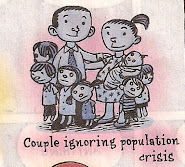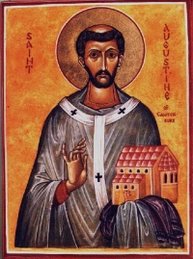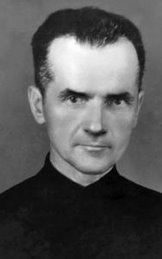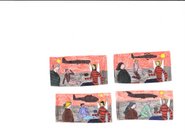This is today’s (Sunday’s) Gospel reading:
Jesus said to the crowds:“I am the living bread that came down from heaven;
whoever eats this bread will live forever;
and the bread that I will give is my flesh for the life of the world.”
The Jews quarreled among themselves, saying,“How can this man
give us his flesh to eat?” Jesus said to them,“Amen, amen, I say to you,
unless you eat the flesh of the Son of Man and drink his blood,
you do not have life within you. Whoever eats my flesh and drinks my blood
has eternal life,and I will raise him on the last day. For my flesh is true food,
and my blood is true drink. Whoever eats my flesh and drinks my blood
remains in me and I in him. Just as the living Father sent me
and I have life because of the Father,
so also the one who feeds on me
will have life because of me. This is the bread that came down from heaven.
Unlike your ancestors who ate and still died,
whoever eats this bread will live forever.” (John 6:51-58)
If you recall, some of Jesus' disciples left Him after that, and He didn't call them back, saying
"I was JUST KIDDING! I MEANT ALL OF THAT TO BE A SYMBOL!"
It is interesting that on the same day we were visited by some folks bearing tracts from that hotbed of theology, Plano, Texas. The tract is called Is a Roman Catholic Christian an Oxymoron? Sadly, none of the folks seemed inclined to come and see Our Lord in the Blessed Sacrament. They were probably afraid to enter the Church, for our Faith is a gift, and some of those who come into the presence of Our Lord find there is no turning back.
After spending a couple of hours in front of the Blessed Sacrament, and having my wife read this tract to me on the ride home, I thought I would make a few comments about this tract. For a publication bent on relating the truth, it seems to stretch it quite a bit.
First, the words ‘Christian’ and ‘Roman Catholic’ are defined by the author. Webster is used to define oxymoron. The author defines ‘Christian’ as one who believes the Gospel, and a Roman Catholic is defined as one who believes the official teachings and traditions of the Roman Catholic Church. Funny, but Webster defines ‘Christian’ as “a person who believes in Jesus as the Messiah and in the religion based on the teachings of Jesus.” No mention of the Gospel in the definition. A Roman Catholic is a person “…belonging to the Christian church that has the pope as its head.”(Bold text mine) Webster’s definitions were not good enough for this author because it is easier to disprove something if one manufactures his own terms.
The first argument is that the Church has authority over Scripture: The Catechism of the Catholic Church is quoted:
“The manner of interpreting Scripture is ultimately subject to the judgment of the Church which exercises the divinely conferred commission and ministry of watching over and interpreting the Word of God"(119).
The actual sentence reads:
“For, of course, all that has been said about the manner of interpreting Scripture is ultimately subject to the judgement of the Church which exercises the divinely conferred commission and ministry of watching over and interpreting the Word of God."(119)
It changes the meaning a bit. However, the process of looking up this one paragraph sent me looking for the documents of the Second Vatican Council, which sent me off again to the writings of the likes of St. Augustine, whose quote is worth repeating:
“But I would not believe in the Gospel, had not the authority of the Catholic Church already moved me.”(also part of 119)
Next, Baptism is discussed, in a carefully truncated piece of Paragraph 694:
”The water of baptism truly signifies our birth into the divine life.”(694)
This paragraph, first of a series discussing the Symbols of the Holy Spirit, actually says:
"Water. The symbolism of water signifies the Holy Spirit's action in Baptism, since after the invocation of the Holy Spirit it becomes the efficacious sacramental sign of new birth: just as the gestation of our first birth took place in water, so the water of Baptism truly signifies that our birth into the divine life is given to us in the Holy Spirit. As "by one Spirit we were all baptized," so we are also "made to drink of one Spirit." Thus the Spirit is also personally the living water welling up from Christ crucified as its source and welling up in us to eternal life."(694)
To read about Baptism, I would direct the author to paragraphs 1213-1284, with just a brief quote from paragraph 1213:
"Baptism is the sacrament of regeneration through water in the word."
I would love to go on through this tract, perhaps another time, but it is getting late. I would have to say that this exercise has been refreshing, but I would predict that in every instance the author has chopped up the Catechism of the Catholic Church to fit his arguments, much in the same manner that he made up his own definitions to support his views.
I would also add that by opening up the Catechism of the Catholic Church and reading parts of it, my love for the Church and desire to bring more people into the Church, specifically the author of this tract, has increased.
I am sure time in front of the Blessed Sacrament had a lot to do with this.
dadwithnoisykids
F-K 9.1


















1 comment:
Thank you for your graciousness to these people. The man who wrote the tract is supposedly a former Catholic. These "people" had at one time had this man call my husband and I when we were first looking to enter the Church. We willingly met with him, and he had no answers for us. He is your normal anti catholic with not a good argument in the book!
Again, my apologies to you. I was quite proud of my parish on Sunday and I was mortified at the same time. God bless you and your wife for raising children who can defend their faith!
Post a Comment